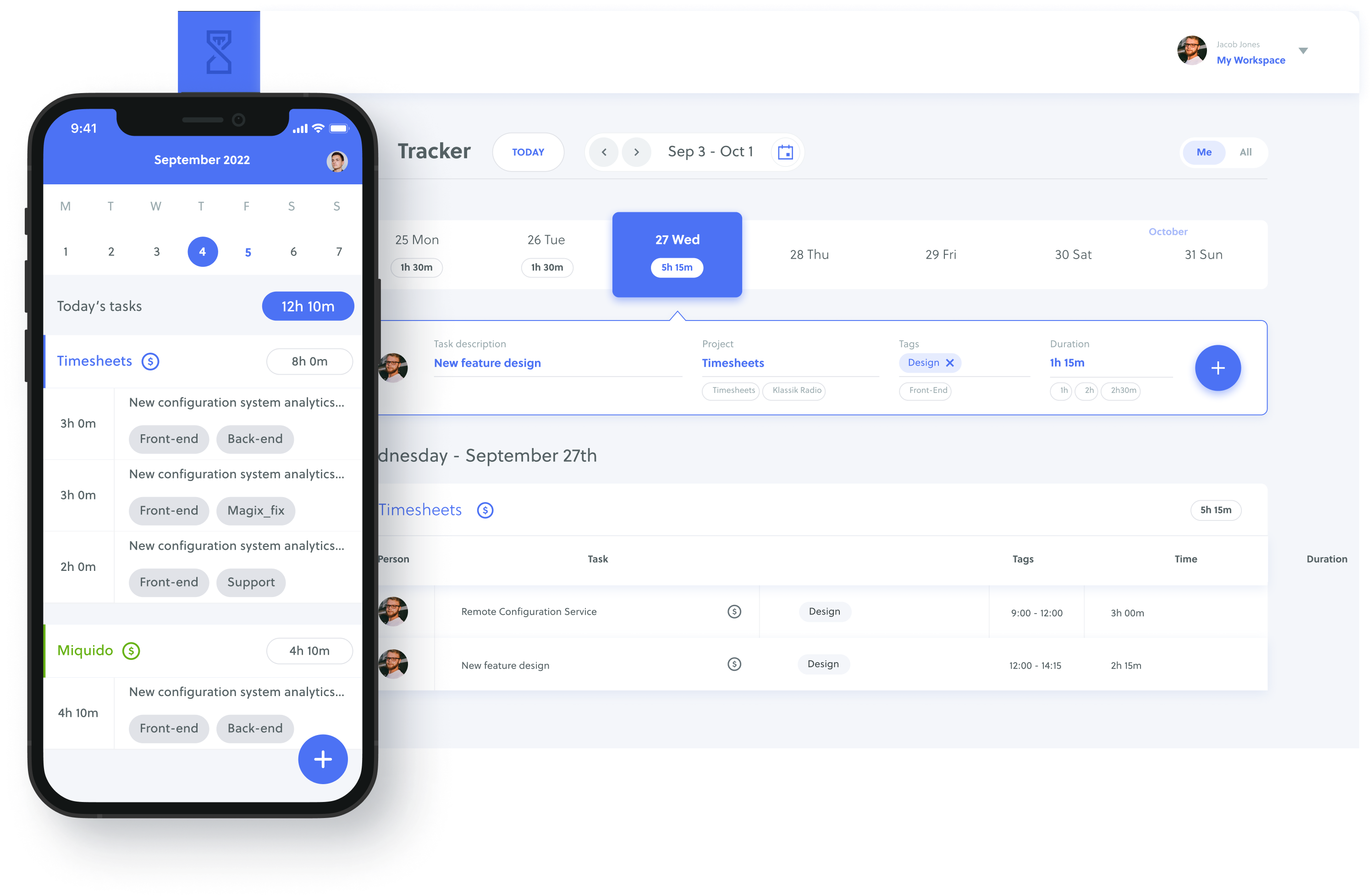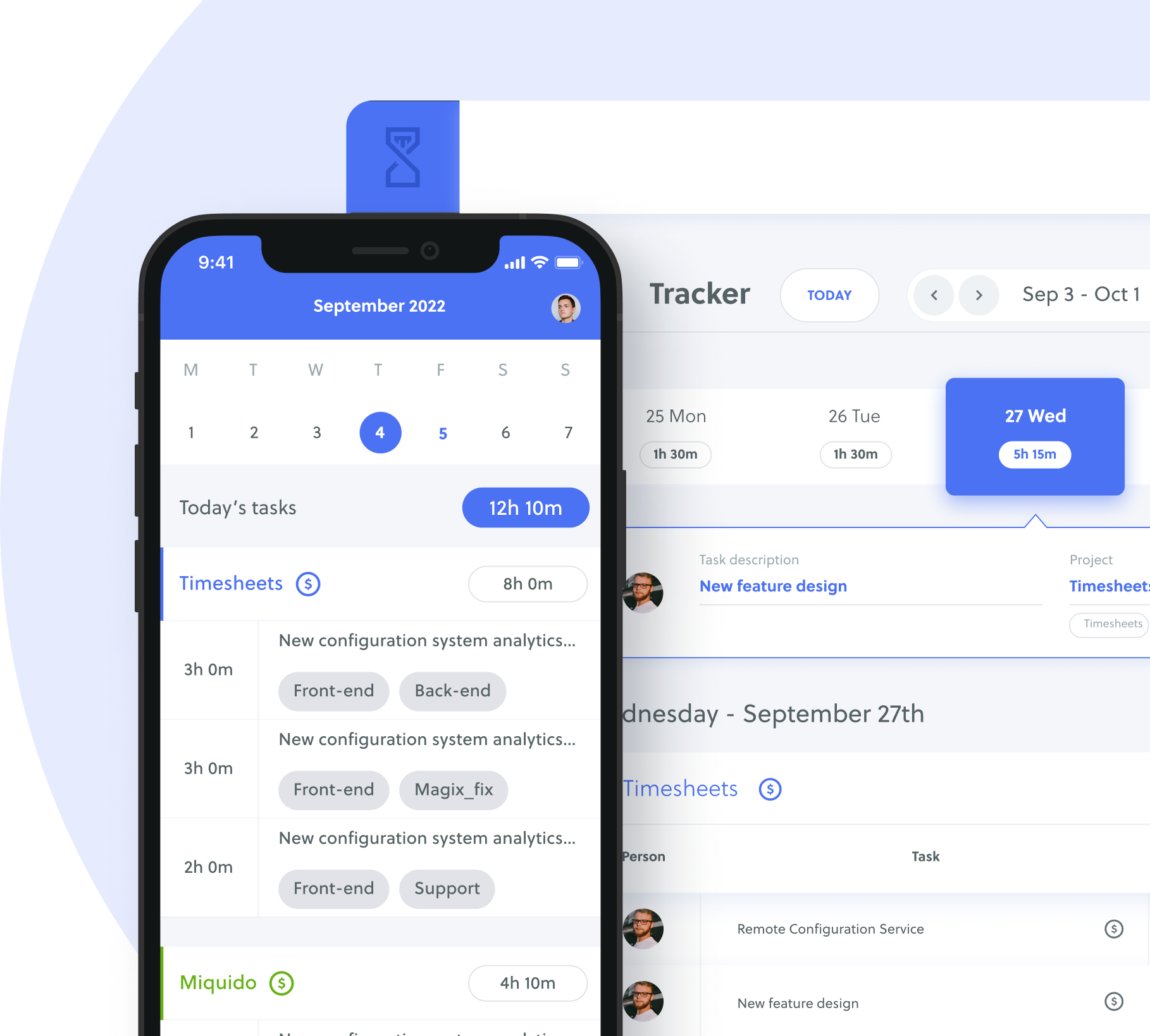Most people struggle with not doing enough. But some of us take it to the extreme, turning our passion and dedication into an addiction to work. It might feel like you’re doing great things, but if it’s become a compulsive behavior that is impacting your health or relationships, then it’s time to ask yourself if you are addicted to work.
If you’re constantly glued to your desk and unable to take proper breaks, you might be suffering from workaholism – a dangerous addiction that can have serious consequences.
But don’t worry – at Quidlo, we’ll show you everything you need to know about workaholism and explore how to treat it to reclaim control over your time.
Ready? Let’s go.
⚠️ Note: We are not certified medical professionals. Please see a doctor in case of serious workaholism problems.
Table of Contents
Is workaholism an addiction?
Yes, workaholism is an addiction. Just like how alcoholism, gambling, and drug addiction are addictions. The term “workaholic” was actually coined by Dr. Wayne Oates, an American clergyman and psychotherapist (a workaholic himself), in his book “Confessions of a Workaholic: The Facts About Work Addiction” published in 1971.
Recognized as a real mental health condition, it’s defined as an unhealthy obsession with work, that leads to physical, mental, and social problems. People dealing with this condition often feel compulsive to work and can’t stop.
Workaholism is similar to any other addiction in that it leads to a loss of control over your lifestyle and behavior. It can become all-consuming, leaving you feeling burnt out and unable to focus on the important things in life – like relationships, hobbies, and self-care.
👉 Related: 50+ Workaholism Facts and Statistics
How workaholism affects your life (badly, pretty badly)
Many workaholics may think their workaholism is a good thing, or at the very least, a necessary thing for their purpose. Others may simply let it go on because they fail to see the consequences of it.
But workaholism can lead to a host of physical, mental, and social problems. Here are some of the most serious, scientifically-shown negative effects you need to consider:
- It can lead to burnout: Working long hours or focusing too much on work can lead to mental and physical exhaustion, which can negatively affect your productivity and overall well-being.
- Jeopardizes your relationships: Workaholism can lead to neglecting your relationships with family and friends, which can cause strain and resentment.
- Your physical health takes a hit: Chronic workaholism can lead to poor physical health from sleep deprivation, stress, and an increased risk of heart disease.
- It can lead to poor work-life balance: When you prioritize work over other important aspects of your life, you have a lack of balance and feelings of dissatisfaction with your overall life.
- Takes a toll on your mental health: You’re more prone to feeling anxiety, depression, and stress, which can have negative effects on your overall mental health and well-being.
- You experience social isolation: By prioritizing work over other aspects of your life, workaholism can lead to a lack of social connections and support, which can have negative impacts on your overall well-being.
- It can have negative impacts on your finances: Workaholism can lead to overspending on work-related expenses or neglecting financial responsibilities in order to focus on work.

How do I know if I’m a workaholic?
Many people don’t even realize that they are workaholics, as it can be an unconscious behavior. In this section we’ll go through the characteristics of workaholism, and present a series of questions you can ask yourself to determine if you are a workaholic.
Characteristics of a workaholic person
Some people don’t think they’re workaholics, and some just don’t know that they are. Scott, Moore and Miceli (1997) introduced three types of workaholic behavior patterns: compulsive- dependent, perfectionist, and achievement-oriented.
These qualities ring true and typically translate into the following day-to-day habits, as shown in a study of 2,000 employed Americans by the New York Post:
A tendency to work long hours: Workaholics may work longer hours than necessary or required, often to the detriment of their personal life. Almost half of the respondents (46%) reported that they are usually the first to arrive and last to leave at work. Additionally, almost as many people mentioned being too busy to take a break from work during their holidays.
You have difficulty taking breaks: Taking pauses in your work helps you reset to stay focused and energized. But workaholics may have a hard time taking time off or disconnecting from work, even when it is necessary for their well-being. For example in 50% of cases, they have difficulties switching off while on vacation, or they simply work throughout their vacations.
You don’t like to delegate tasks: Workaholics may have a hard time trusting others to complete tasks or may feel that they are the only ones capable of doing the work.
You prioritize work over other aspects of life: In 54% of cases, workaholics prioritize work before their personal lives, which includes personal relationships, leisure activities, and self-care. And 51% of the time, they worry about work, even on a day off.
You have to be perfectionistic: Workaholics may have high standards for themselves and may feel a need to be perfect in their work. This just snowballs into more time spent at work and less time for themselves.
Difficulty setting boundaries: Workaholics may have a hard time setting boundaries with their work, such as saying no to additional tasks or setting limits on the amount of time they spend working.

The Bergen Work Addiction Scale: A work addiction risk test
Dr. Cecilie Andreassen and her team at the University of Bergen developed the Bergen Work Addiction Scale after testing 12,000 Norwegian workers from 25 different industries.
With just seven simple questions, the scale rates the behavior of workaholics, behavior similar to that of addicts of all kinds, including drug addicts and alcoholics.
Rank yourself on each of the following statements:
1 = Never, 2 = Rarely, 3 = Sometimes, 4 = Often and 5 = Always
- You think of how you can free up more time to work
- You spend much more time working than initially intended
- You work in order to reduce feelings of guilt, anxiety, helplessness, and depression
- You have been told by others to cut down on work without listening to them
- You become stressed if you are prohibited from working
- You prioritize work over hobbies, leisure activities, and exercise
- You work so much that it negatively influences your health
If you score 4 (Often) or 5 (Always) on four or more of these statements, you may be a workaholic.
The 10 types of workaholics: Which kind are you?
Over the years, many different types of workaholics have been identified by researchers, suggesting that different individuals may have different triggers and motivations for their compulsive behavior.
With eye-opening studies from Dr. Bryan E. Robinson (2001) and Dr. Morley D. Glicken (2010), there are 10 types of workaholics that have been identified, each with their own set of characteristics and habits.
- The Relentless Workaholic: These individuals are driven by a relentless desire to succeed and may prioritize their work over their personal well-being. They work long hours and push themselves to meet deadlines and achieve high levels of productivity.
- The Procrastinating Workaholic: If you’re in this category, then you may work excessively in order to meet deadlines that they have procrastinated on. They feel anxious or guilty when they are not working and prioritize work over their own well-being and relationships. A smart way to combat this is the idea of “eating the frog” which is to get the ball rolling by tackling the hardest task first thing in the morning so you’re less likely to avoid everything else.
- The High Stimulus-Seeking Workaholic: These people seek out high-stress or high-risk projects in order to get a rush or thrill from their work. Some create tight work deadlines, juggle multiple projects at once, while others engage in high-risk jobs or activities like playing the stock market, working in a hospital emergency room, or parachute jumping. Basically, they’re motivated by the excitement and novelty of their work.
👉 Related: 9 Project Management Skills You Need to Have
- The Bureaupathic Workaholic: This breed of workaholic tends to prolong tasks and create additional work for themselves, often to the detriment of their time management skills. To counteract this, focus on one task at a time (we call this monotasking). By taking a single task and devoting your full attention to it, you can become more efficient and effective.
- The Loner Workaholic: These individuals prefer to work alone and may feel uncomfortable in social situations. While they’re eager to put in the effort and be appreciated, autonomy is very important to them. They also tend to prioritize their work over personal relationships.
- The Frightened Workaholic: Meet the souls motivated by a fear of failure or a fear of not being able to meet their responsibilities or losing their job. They work excessively in order to avoid facing these fears.
- The Burned-Out Workaholic: People like this are so worn out that they can barely muster the energy to get through the day, but because they don’t have other interests and activities or a dismal or nonexistent personal life, they keep working hard at jobs they don’t enjoy or dislike, even to the point where they get sick. Without help, these people often develop depressions and anxiety-related problems, which make work impossible.
- The Incompetent Workaholic: Most of us think of workaholics as hard-working and super productive, but some workaholics have to work that much harder because they struggle to do the job properly. There’s no lunch break, they stay late, and they come in on the weekends, but they never seem to get anything done. This may therefore be more of an issue of competence instead of psychological reasons for their work addiction. A less-demanding job would probably minimize their work addiction.
- The Dictatorial Workaholic: These individuals are driven by a desire for power and control, and use their work as a way to assert their dominance. This kind of person is also known to overwork others, thinking that it’s a sign of commitment and dedication.
- The Manic-Depressive Workaholic: These individuals experience extreme highs and lows in their work habits, alternating between periods of extreme productivity and periods of inactivity.

Workaholism & Mental Issues
Workaholism is often considered a mental issue because it can have a negative impact on an individual’s mental well-being. The common culprits are:
Stress: Excessive work can lead to high levels of stress and burnout, which has shown to contribute to mental health problems such as anxiety and depression.
Poor work-life balance: Workaholics may struggle to maintain a healthy balance between their work and personal lives, which can lead to feelings of guilt, frustration, and resentment.
Social isolation: Workaholics may prioritize their work over their personal relationships, leading to feelings of loneliness and isolation.
Poor self-care: Workaholics may neglect their own physical and emotional needs (like personal hygiene or a mental health break) in favor of work, which can lead to negative consequences for their mental health.
Negative thoughts and emotions: Workaholics may struggle with negative thoughts and emotions such as perfectionism, self-doubt, and fear of failure, which can contribute to mental health issues.
Workaholic Personality Disorder
While workaholism isn’t currently recognized as an official personality disorder itself by the psychiatric community, there’s a fair amount of research that suggests it’s a strong symptom of a more encompassing condition called obsessive-compulsive personality disorder (OCPD – characterized by a preoccupation with orderliness, perfectionism, and control).
16,426 people aged 16 to 75 years completed a series of surveys to gauge their work addictions and self-report inventories about ADHD, OCD, anxiety, and depression. Researchers found that these psychiatric disorders were 2-4x more prevalent in work addicts than nonworkaholics.
Specifically:
Nearly 34 percent met the criteria for anxiety
Almost 33 percent for ADHD
More than 25 percent for OCD
9 percent for depression

Overall, the researchers concluded that workaholism is indeed linked to a range of mental issues, and that people with underlying psychiatric disorders may be more prone to work addiction. And, in turn, work addiction may then amplify their pre-existing mental health problems.
Workaholic Emotional Abuse
A workaholic’s toxic behaviors are unhealthy patterns that negatively affect themselves and the people around them. Some examples of workaholic toxic behaviors include:
- Neglecting personal relationships: Workaholics tend to dismiss the needs of their loved ones in favor of work, which can strain relationships and cause conflict. This also comes with a neglection of personal responsibilities such as housework, parenting, and financial matters.
- Demanding perfection: Workaholics may place unrealistic expectations on themselves and those around them in order to perform at an impossibly high standard. This can lead to feelings of frustration, guilt, and long-term resentment.
- Insufficient self-care: Workaholics may neglect their own physical and emotional needs in favor of work, leading to poor health and well-being. Whether it’s not eating properly, lack of exercise, or not enough sleep, which can have negative consequences for their physical and mental health.
- Negative thoughts and emotions: Workaholics may struggle with perfectionism, self-doubt, and fear of failure, which can not only contribute to their own mental health issues, but also drain the energy of those around them, since negative emotions and depression can be contagious.
- Difficulty with delegation: Workaholics may have a hard time delegating tasks or accepting input from others, which can lead to resentment and conflict within a team.
Workaholic Burnout and Depression
The long-term effects of workaholism can be especially damaging. According to the World Health Organization, burnout is a “syndrome conceptualized as resulting from chronic workplace stress that has not been successfully managed.”
Strong research-backed correlations suggest that burnout is a product of prolonged emotional exhaustion, depersonalization, and lack of personal accomplishment. So when a workaholic is stuck in an endless cycle of stress and exhaustion, they may become overwhelmed with physical and emotional fatigue. This can lead to a decline in work performance, difficulty focusing, and even depression.
Like we mentioned before, while workaholism isn’t directly responsible for depression, it can amplify underlying mental issues, which have been shown to cause depression – making it all the more difficult to break free from the vicious cycle.
How to treat workaholism
Treating workaholism can be a complex process, as it may involve addressing underlying issues such as stress, anxiety, or perfectionism, as well as changing long-standing patterns of behavior and work habits.
Here are some steps that may be helpful in reversing the emotional and physical damage of workaholism:
- Identify the root causes of your workaholic tendencies: It may be helpful to reflect on why you feel the need to work excessively. Are you trying to cope with stress, anxiety, or other negative emotions? Are you trying to prove something to yourself or others? Understanding the underlying causes of your workaholic tendencies can help you develop strategies to address them.
- Set boundaries: It’s important to set limits on your work time and prioritize self-care and other aspects of your life. Create a work-free zone and make time for hobbies, exercise, and socializing to disconnect from work when you are not on the clock. There are also some time management techniques that can help you manage your workload in a healthy way.
- Know how your time is being spent: Knowing how you spend your time will help you better structure your days to become more productive in certain parts of the day to keep balance in your life, so you can avoid workaholism. Quidlo is a time tracking tool that will open your eyes on the abnormal amount of time you might be spending on tasks. Just start the timer before you begin any labeled task and stop it when you finish.
👉 Related: 9 Benefits of Time Tracking
- Try the Pomodoro method: One of the biggest struggles for workaholics is learning to take breaks. Well, the Pomodoro technique is a great way to build breaks into your workday. It involves setting a timer for 25 minutes of intense focus and then taking a 3-5 minute break. You can repeat the cycle as many times as you like, allowing yourself to take breaks and maximize productivity. Check out the best Pomodoro apps and how to use it here.
- Prioritize tasks with the Covey time management matrix: You can break down your tasks into four categories: important/urgent, important/non-urgent, non-important/urgent, and non-important/non-urgent. This will help you prioritize the tasks that are most important and urgent, while still being mindful of the other tasks that need to get done.
- Pair your priorities with time budgeting: Once you’ve identified the tasks you need to get done, it’s time to create a budget for how much time you’ll spend on each task. This will help you stay on top of your deadlines, avoid Parkinson’s law (when work expands so as to fill the time available for its completion), and make sure you don’t get too bogged down with one particular task.
- Take a digital detox: Consider taking a break from your electronic devices, such as your phone or computer, for a period of time. This can help you disconnect from the constant barrage of work-related notifications and give you a chance to relax and recharge.
- Practice mindfulness & relaxation techniques: Mindfulness techniques such as meditation awareness training, deep breathing, or journaling can help you stay present and focused on the task at hand, rather than constantly thinking about work.
- Learn to delegate: Workaholics may feel like they have to do everything themselves, but it’s important to recognize that it’s okay to delegate tasks to others. This can help you manage your workload and reduce the pressure you feel to work excessively.
- Seek support if needed: It can be helpful to talk to a mental health professional or a trusted friend or family member (you could also consider family therapy), or in extreme cases seek inpatient treatment for your workaholic tendencies and the impact they are having on your life. A therapist can help you develop healthy coping strategies and address any underlying mental health issues that may be contributing to your workaholic tendencies.
For example, Cognitive Behavioral Therapy (CBT): CBT is a well-documented type of therapy that can help you identify and reframe negative thought patterns and behaviors. It involves challenging core beliefs related to your sense of self-worth, perfectionism, and fear of failure in order to reduce stress and increase self-compassion.
To find a mental health professional, you can start by asking your primary care doctor for a referral or by searching online directories of mental health professionals in your area. You can also contact your insurance company to see which providers are covered under your plan. It may also be helpful to ask friends or family members for recommendations. It’s important to find a mental health professional that you feel comfortable with and who has experience treating workaholism or related issues.
Workaholic Withdrawal Symptoms
As you try to reduce your work hours and take a break from work, you might experience some withdrawal symptoms. These symptoms may be physical, emotional, or psychological in nature, and can vary in severity. Here’s what a recovering workaholic might expect:
Physical symptoms: Workaholics may experience physical symptoms such as headaches or insomnia when they try to take a break from work. These symptoms may be caused by the physical strain of working long hours or the sudden reduction in activity when taking a break.
Emotional symptoms: Workaholics may experience emotional symptoms such as anxiety, irritability, or depression when they try to reduce their work hours. They may feel anxious about their ability to cope with a reduction in work or about the potential consequences of taking a break.
Psychological symptoms: Workaholics may experience psychological symptoms such as a sense of loss or a lack of purpose when they take a break from work. They may feel like they are missing out on something or that their identity is tied to their work.
To mitigate withdrawal symptoms, it may be helpful to:
- Gradually reduce your work hours: Rather than trying to stop working altogether, it may be helpful to gradually reduce your work hours over time. This can help you adjust to the change and may make it easier to cope with the symptoms of withdrawal.
- Seek support: It can be helpful to talk to a mental health professional or a trusted friend or family member about your experience. They can offer support and guidance as you adjust to the changes in your life.
- Focus on the positives: Remind yourself of the positive aspects of taking a break from work, such as more time for leisure activities or relaxation.
- Take breaks: It’s important to take regular breaks and engage in activities that bring joy or relaxation to reduce stress levels, practice self-care, and recharge.
Parting words
Breaking a workaholic addiction is not easy, but it can be done. It requires dedication and commitment to make changes in how you think about work and your identity.
Taking the time to practice mindfulness techniques, create a budget for your tasks, and seek help if needed are all important steps on this journey. Withdrawal symptoms may arise as you adjust to these changes — however, by taking breaks regularly and focusing on the positives of reducing your workload, you can manage them successfully.
By making a conscious effort towards better management of time with Quidlo’s assistance, we will surely be able to break free from the shackles of Workaholism!







